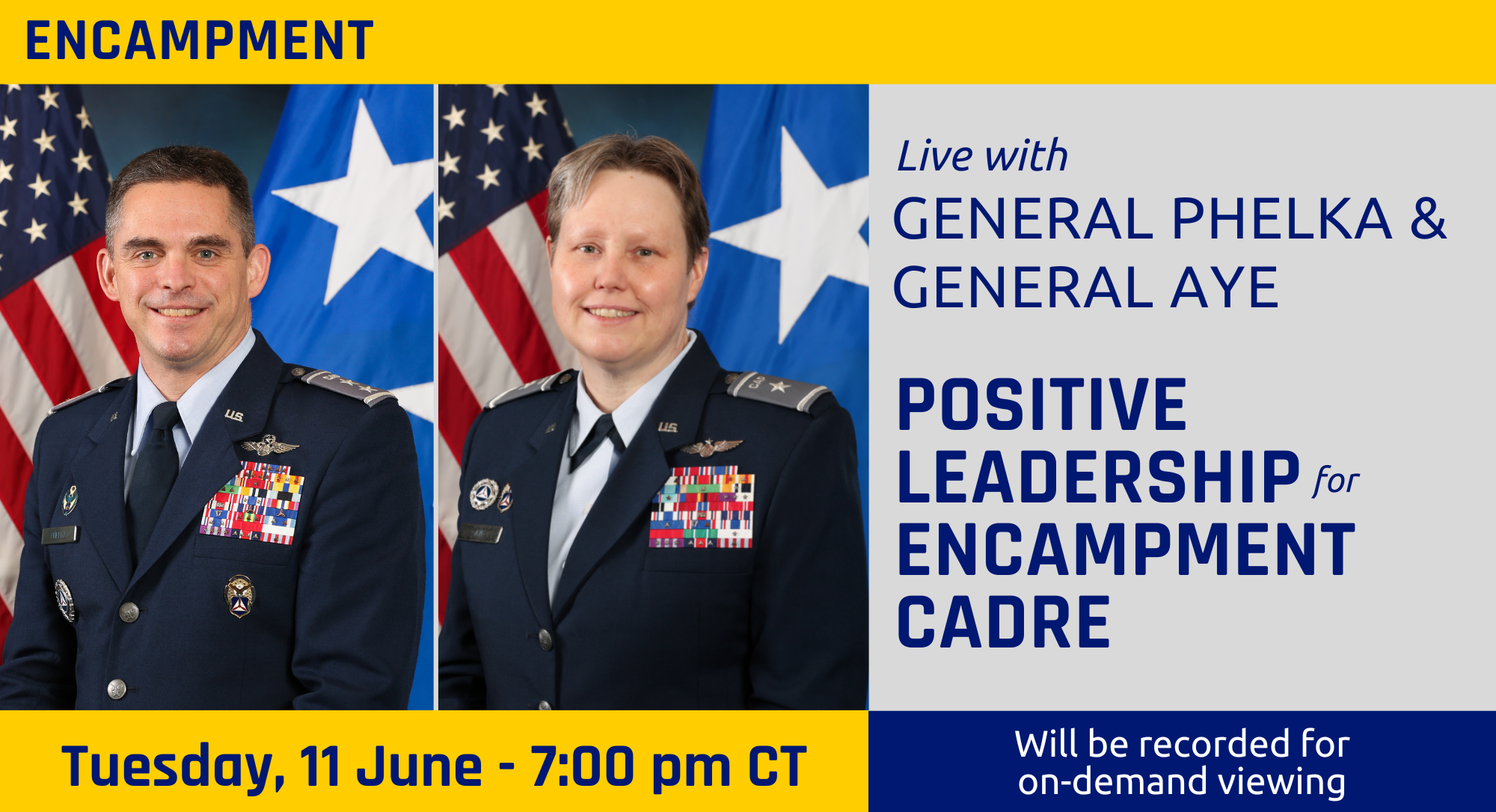Empowering Leadership & Command Vision: Top Q&A (2.0 Happening Soon)
Posted on June 3, 2024 at 3:56 PM by Katie Thurson
Recently, our current National Commander General Phelka, our incoming National Commander General Aye, and our Chief Mission Resources Officer and retired Air Force Military Training Instructor (MTI) and MTI supervisor, Mike Valdez led an empowering webinar focused on the fundamentals of positive leadership in an encampment setting. Covering essential topics such as command vision, the crucial role of cadet cadre, and strategies for fostering positive leadership, the session provided attendees with practical insights and strategies. This interactive discussion also included a live Q&A, offering participants the opportunity to delve deeper into effective leadership techniques.

This webinar and associated Q&A was so well-received by both cadet and senior members alike, that Cadet Programs will be hosting “Positive Leadership for Encampment Cadre 2.0” on June 11, 2024 from 7:00-8:00 PM CST, as another opportunity to hear from this knowledgeable and inspiring group of seasoned leaders in preparation for the busy summer season (register here).
In the initial webinar, attendees submitted questions that were met with helpful and empowering answers from General Phelka, General Aye, and Mr. Valdez. Below, there is a featured selection of the top questions along with their corresponding responses.
Top Questions and Responses
Key Elements of Effective Command Vision
What are the key elements of effective command vision in an encampment setting?
General Phelka emphasized the importance of clear communication, setting achievable goals, and inspiring confidence in the mission among both cadre and trainees. General Aye added that aligning the vision with CAP's core values ensures a strong foundation for leadership. Furthermore, they stressed the need for adaptability and flexibility in leadership, especially in dynamic environments like encampments.
Mentorship and Support for Newer Cadets
How can cadet cadre effectively mentor and support newer cadets during encampment?
Mr. Valdez underscored the role of cadet cadre as teachers and mentors, encouraging them to lead by example and foster a positive learning environment. He highlighted the significance of empathy and understanding in guiding younger cadets through their CAP journey. Additionally, providing regular feedback allows cadet cadre to identify areas for improvement and offer constructive guidance, fostering growth and development among newer cadets.
Balancing Training Intensity and Positive Environment
Is there a balance between training intensity and maintaining a positive environment, especially with younger cadets?
General Phelka and Mr. Valdez both emphasized the importance of balancing training intensity with creating a supportive atmosphere, particularly for younger cadets. They emphasized that while some degree of intensity may be necessary for certain training objectives, it should always be purposeful and tied to learning outcomes. Moreover, they suggested incorporating team-building activities and opportunities for reflection to foster camaraderie and morale among participants.
Training Intensity vs. Hazing
Where's the line between training intensity and hazing, and how do you increase intensity without being too harsh?
Training intensity and hazing are distinctly different, with hazing defined by conduct that's cruel, abusive, or demeaning, as outlined in CAPR 60-2. While it's crucial to challenge cadets, it must be done constructively, avoiding any form of belittlement or harm. Constructive feedback and specific instructions for improvement, like refining drill techniques, are effective ways to ramp up intensity without crossing into hazing territory. By prioritizing cadet well-being and skill development, leaders can create a positive training environment that fosters growth and resilience. As Mr. Valdez put it, there is no fine line between hazing and training intensity. Hazing is hazing and ramping up intensity is ramping up intensity.
Conflict Management within Cadre Teams
How can cadet cadre effectively manage conflicts or challenges within their team?
General Aye emphasized the importance of open communication and proactive conflict resolution. She encouraged cadre members to address issues promptly, listen to all perspectives, and work towards collaborative solutions that uphold CAP's core values. Implementing strategies for collaborative problem-solving can help resolve conflicts effectively while strengthening team cohesion. By fostering a culture of respect, empathy, and open communication, cadre can effectively manage conflicts within their teams and promote a positive working environment.
Importance of Self-Care for Leadership
What role does self-care play in maintaining effective leadership during the demanding encampment season?
Mr. Valdez highlighted the significance of self-care for cadre members, emphasizing the importance of setting boundaries, prioritizing mental and physical well-being, and seeking support when needed. General Phelka added that practicing self-care sets a positive example for others and enhances overall leadership effectiveness. Moreover, they stressed the need for self-awareness and resilience in leadership, advocating for regular self-reflection and self-improvement practices to sustain long-term success.
The upcoming "Positive Leadership for Encampment Cadre 2.0" promises to build upon these insightful discussions, providing attendees with further guidance and inspiration as they prepare for their roles in encampment leadership. Don't miss this opportunity to learn from experienced leaders and empower yourself for success in the CAP community!



